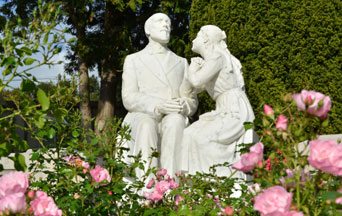
The figure of the father is under attack these days. To those who insist upon total equality, he is seen as an overbearing figure who has long abused his power. Like all symbols of authority, he must be overthrown.
It is curious that whenever feminists wish to attack the father, somewhere in their long tirades, there will appear the word “patriarchy.” The mention of this word is not by chance. It echoes the core of the feminist creed.
Ironically, those who are accused of defending patriarchy are usually members of nuclear families, not patriarchal ones. Many indeed are not even members of extended families. They do not have a notion of what patriarchy means and how it functions. And thus they are not in conditions to defend themselves against the feminist rage.
Learn All About the Prophecies of Our Lady of Good Success About Our Times
Embracing Patriarchy
Those who defend the family have no cause to fear the term and every reason to embrace it. When stripped of its non-Christian forms and feminist caricatures, patriarchy becomes a refreshing idea. Even today, the image of an ancient patriarch evokes sentiments of veneration and respect.
However, there is a reason why feminists attack patriarchy so violently: It represents the plenitude of fatherhood. It is the father figure as he should be. Such a vision is part of the natural hierarchical society that feminism rejects.
Understanding Patriarchy
The key to understanding patriarchy lies in the long forgotten idea of the traditional family. The Catholic Church has long taught that the family is not a single social unit existing in the present without connection to the past or future. Rather, the family is a rich and continuous whole that encompasses all those who have come before and will come after. Thus, each family becomes a vast network of interwoven relationships and is part of the social fabric.
Patriarchy is a natural consequence of the traditional family. It holds that since this vast social unit exists, there should be an authority that maintains its unity. This authority is usually the patriarch.
The influence of the patriarch extends beyond his immediate household and encompasses several generations. It might include several branches of the family, even an entire clan.
The patriarch does not exercise an arbitrary or tyrannical authority. Indeed, he exerts a unifying leadership over the whole that is expressed more often by influence than by command. He guides with great care and subtlety the interrelationships between so many people who are alike in so many ways but who are also so very different.
The Patriarch as Harmonizer
Thus one of the most important roles of the patriarch is to be a harmonizer. He maintains the family line in harmony with its past and future. He must strike a delicate balance between those in the family who guarantee necessary continuity and those who energetically introduce healthy innovation.
The patriarch is a true leader of the family. He has a special gift to discern and coordinate the general direction of those under him. He seldom imposes his will upon the others, but rather sets the tone and the example. He unifies and brings out the best in others.
The Gift of Marriage and the Proper Role of Parents in the Education and Formation of Their Children
That is why traditionally the patriarch is portrayed as one who ponders things. He is judicious and weighs matters with criteria and acumen. He applies the family’s treasure-trove of wisdom which is preserved, enriched, and passed on from one generation to the next.
Source of Progress and Culture
It is easy to see that when society is filled with patriarchal figures on all social levels, it creates the ideal conditions for the true progress of a culture. The patriarch is what sociologists call a representative character who moves his family members toward goals of perfection in line with the family’s qualities and talents. When imbued with Catholic virtue, the patriarch moves his family members to the highest of all goals: their sanctification.
Such figures are sadly missing in today’s crumbling society. Individuals each go their way. There are no harmonizers or coordinators that unify families and direct their progress.
When attacked for being patriarchal, fathers today should embrace the idea. The patriarch only does on a larger scale that which the father is called to do within his family.
There is nothing wrong with building a family thinking of the long term. There is nothing wrong with desiring unity and direction for those under one’s care. Rather than an undesirable condition to be avoided, patriarchy is an idea whose restoration time has come.

